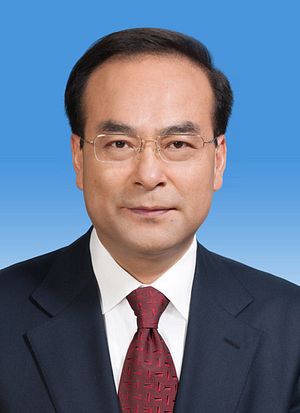The political earthquake in China is still undergoing. On July 24, China’s official news agency Xinhua posted an extremely brief statement, announcing that the former Chongqing party leader Sun Zhengcai has been put under the investigation by the Central Commission for Discipline Inspection (CCDI) with a case on file for “serious violations of discipline.” Hours after the announcement — at midnight of July 25 — Chongqing authorities issued a long and detailed statement pledging to “resolutely support the central decision.”
According to the statement, on the same day as the Sun announcement, Chongqing’s standing committee held an enlarged meeting. Sun’s successor, Chongqing’s current party leader Chen Min’er; Chongqing mayor Zhang Guoqing; all the other Chongqing municipal government officials and party officials; all the high officials of Chongqing High Court, Procuratorate, and universities; and some high-level retired officials all attended the meeting. All the attendees learned of the Central Committee of the Communist Party of China (CPC) decision on Sun and “resolutely” support it, the statement said.
The statement could be seen as a manifesto of Chongqing’s loyalty to the Central Committee.
First, it complimented the central committee’s resolution on anti-corruption and claimed that the authority’s decision is “conducive to Chongqing’s reform, development, and stability.”
Second, it pledged to uphold Chongqing’s political priority of “firmly maintaining General Secretary Xi Jinping’s core position.”
Last, it assured the Central Committee that Chongqing would “resolutely and thoroughly remove the ideological legacy of Bo Xilai and Wang Lijun” and maintain the order in Chongqing.
As most long-time Chinese observers might know, the Bo Xiliai and Wang Lijun case was the biggest and most sensational political scandal in China since the Deng Xiaoping era. Wang, a former Chongqing vice mayor, tried to claim asylum at the U.S. consulate in Chongqing, fearing for his safety due to a political falling out with Bo’s family. The Wang incident brought an abrupt end to the political career of Sun Zhengcai’s predecessor Bo Xilai in 2012. Bo was sentenced to life imprisonment in 2013.
It is particularly worth noting that the so-called “ideological legacy of Bo Xilai and Wang Lijun” has been repeatedly mentioned at various occasions recently. It seems that Bo and Wang’s spirit is still haunting Chongqing city after nearly five years.
In February 2017, the CCDI sent an inspection group to Chongqing. After serious inspections, the central inspection group harshly criticized Chongqing for multiple problems. One of the most important problems was that Chongqing, under the Sun’s administration, failed to “fully remove the ideological legacy of Bo Xilai and Wang Lijun,” although the inspection group didn’t explain (at least to the public) what that legacy really was.
Immediately after the inspection group criticized Chongqing, Sun made a harsh self-criticism and pledged to correct all the problems.
Unfortunately, it seems that after five months of correction, the Central Committee still doesn’t think the problems have been solved and “the ideological legacy of Bo Xilai and Wang Lijun” has been removed from Chongqing.
As the New York Times noted, Sun “is the most senior serving politician purged so far in a five-year drive against corruption.’’ Undoubtedly, in the following months or even years, the whole Chongqing municipal government will be busy with removing the legacy of Sun, Bo, and Wang.
Charlotte Gao holds a MA degree in Asian Studies. Her research interests center around East Asian topics. She has worked in the past as a news editor, reporter, and writer for multiple traditional, online, and new media outlets.































